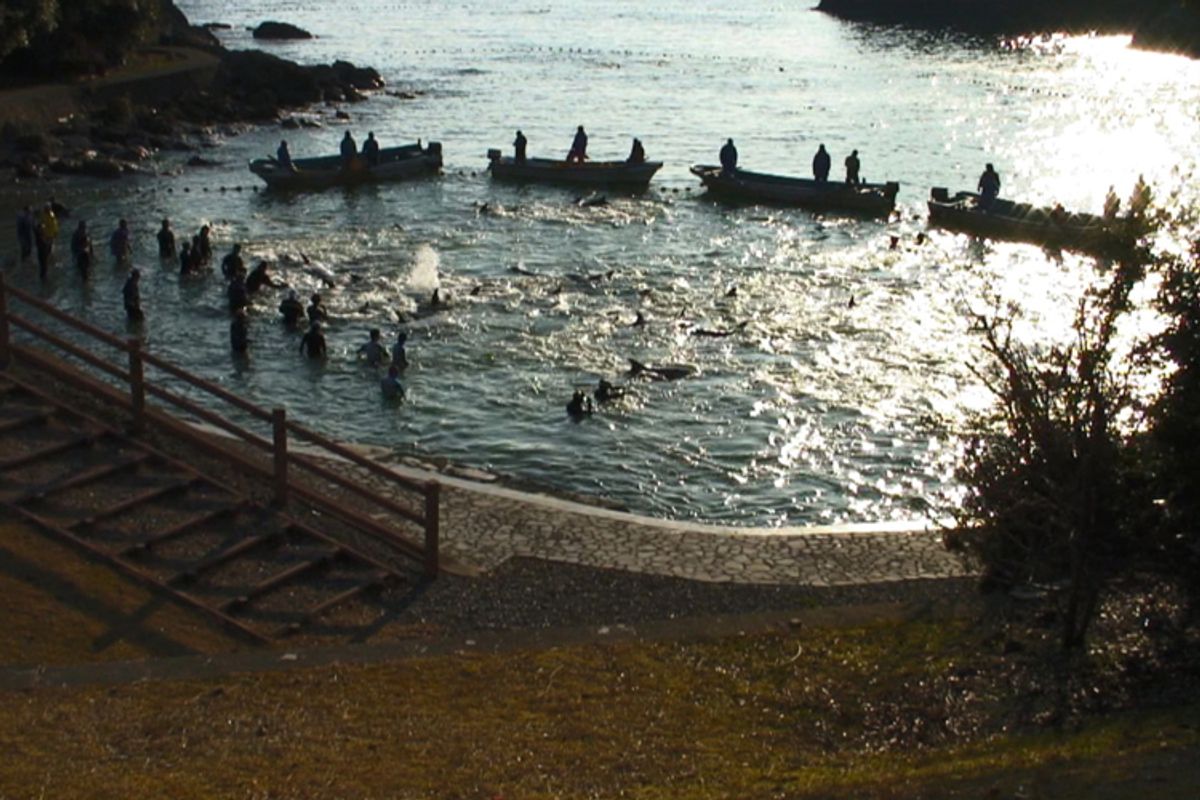The Japanese fishing village featured in "The Cove," which won an Oscar for best documentary, defended its practice of hunting dolphins Monday as a part of a long tradition.
The movie, which mixes stunning underwater shots of gliding dolphins with covertly filmed grisly footage of their slaughter, also claims that dolphin meat is laden with toxic mercury.
Taiji, a quiet fishing village on the rocky coast of southwestern Japan, kills only a small fraction of the dolphins hunted by the country each year. But it has long been a target of environmentalists and animal lovers because it uses a method called "oikomi," in which the dolphins are chased into shore, making the hunt more visible.
Though few residents said they had seen the film, there was universal disgust at its portrayal of the town. Taiji proudly bills itself as "Whale Town" and a main bridge is adorned with dolphin statues, but after years of what locals see as unfair treatment by the foreign press, few are willing to talk on the record. One young dolphin trainer turned and ran away when asked for her opinion.
"This is a close-knit group of fishermen. The more they feel squeezed, the more they will close off to outsiders. They won't stop this hunt because of such pressure," said Hisato Ryono, a local councilman who appears in the film.
The mayor's office handed out a statement that said Taiji's dolphin hunt is lawful and argued that the movie contained statements that were not based on science. Otherwise, most town officials refused to talk.
"There are different food traditions within Japan and around the world," the statement read. "It is important to respect and understand regional food cultures, which are based on traditions with long histories."
Director Louie Psihoyos said "The Cove" isn't meant to bash Japan but that it is "a love letter to the Japanese people."
"Our hope is the Japanese people will see this film and decide themselves whether animals should be used for meat and for entertainment," Psihoyos said backstage after receiving the Oscar at the Academy Awards ceremony in Los Angeles.
The town of Taiji kills about 2,000 dolphins every year for their meat. Some are captured and sold to aquariums.
The Japanese government, which allows about 19,000 dolphins to be killed each year, acknowledges that dolphin meat is contaminated with mercury, but denies it's dangerous unless consumed in huge quantities.
In September, amid an international outcry following the screening of the movie abroad, villagers released several dozen dolphins that had been caught. But locals say they will continue with the hunt.
The movie has not yet been released in Japan, but it will start showing here in June at 20 to 30 theaters nationwide. It was shown at the Tokyo International Film Festival in October, where viewers gave it mixed reviews.
Still, most Japanese don't know about the annual dolphin hunt, and dolphin meat is hardly eaten in Japan.
Takeshi Kato, president of Unplugged in Tokyo, which is distributing the film in Japan, said the faces of dozens of Taiji residents are being blurred out for the Japan version to ward off possible lawsuits under Japanese law that protects privacy.
"Our purpose is not to attack the people of Taiji," he said.
"If this movie can serve as an opportunity for people to find out, it would be great," he told The Associated Press on Monday.
He said he hopes the film will help open the debate in Japan on preserving nature, including dolphins and whales.
"Receiving the top award in the movie industry will work as a big plus for our efforts to show this movie in Japan," he said.
Ryono, the local councilman, and Tetsuya Endo, an associate professor at Health Sciences University of Hokkaido, both appear in the current version of the film and say they were interviewed under false pretenses. Both say they have asked the filmmakers to remove footage, and Endo says he hasn't ruled out legal action.
"I feel that they should have declined the award," Endo said.
Psihoyos was unable to get permission to access the cove where the dolphins are killed. Fishermen blocked it with barbed wire and fences. So he and his film team secretly broke into the restricted area -- which is in a national park -- at night to set up cameras that capture the slaughter.
Japanese government officials have defended the fishermen's right to hunt dolphins and called the film unbalanced.
"There are some countries that eat cows, and there are other countries that eat whales or dolphins," said Yutaka Aoki, fisheries division director at Foreign Ministry. "A film about slaughtering cows or pigs might also be unwelcome to workers in that industry."
------
Associated Press writer Yuri Kageyama and Malcolm Foster contributed to this report from Tokyo.



Shares